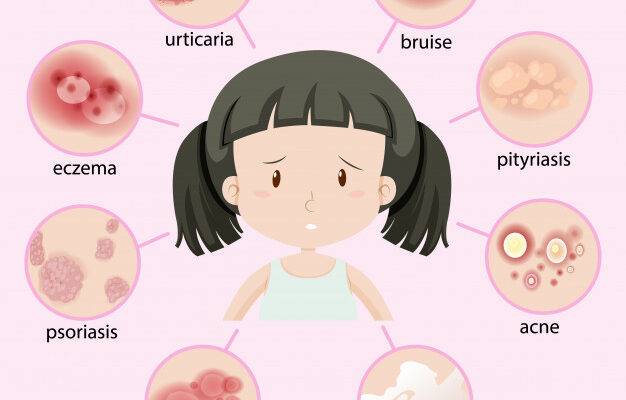HOW DOES FACE MASK IMPACT ON YOUR SKIN?

During the pandemic of COVID-19 virus, the Centers for Disease Control and Prevention recommends that everyone above the age of 2 must wear a mask especially in public place to prevent the spread of virus. Though it may cause discomfort and irritation of your skin if you are wearing it for a prolonged period.
How does face masks’ effect on your skin?
Face masks restricts the oxygen supply to your skin and creates closed environment which may raises the amount of humidity to your skin. Thus, the excessive amount of moisture creates no worries if you are wearing a mask for a short interval of time, as for example while grocery shopping or during a medical checkup. But if you are wearing it for a longer period then it can lead to the irritation of your skin over the nose bridge, chin, or cheeks. If you are having a history of acne, eczema or some type of dermatitis allergy then wearing face mask persistently can worsened your condition. Certain people complain the scratching and rubbing behind their ears due to the elastic bands of mask’s.
Choosing the proper mask
Size and quality are crucial when buying a facemask. Neither it should be too loose that slips off your nose, nor too tight which may cause irritation to your skin. Facemask must be snug fit enough that it stays put on your chin while speaking. Adjustable ear bands are preferable as it provides the comfort and reduce the irritation of your skin.
Cotton masks are softer on the skin and suitable for most individuals. N95 respirators are critical for health care workers, but due to their tight fit, they can cause pressure and damage to skin tissue. If you are required to wear a N95 respirator for work, remove the mask every two to three hours in a safe place away from other individuals for five minutes. Also, when you can safely do so, like after work, switch to cotton masks.
Preventing skin issues
The most important thing you can do to avoid breakouts and inflammation is to keep your skin clean and moisturized. Wash your face gradually before and after wearing your mask with a balanced pH, non-comedogenic cream to remove oil, dirt, and bacteria. First, add a soft, fragrant, non-comedogenic moisturizer to your skin. Check the label for non-comedogenic, non-clogging or non-acnegenic words to pick the suitable option for you.
Search for skin care products that have dimethicone or ceramides as ingredients which could promote healing the skin barrier that prevents mask itchiness. Probably wear buttoned headbands if your elastic band mask develop resistance underneath your ears. There are two categories of products that is recommended to people to avoid when wearing masks. Initially, avoid petrolatum products. This component can disrupt with the function and fit of your mask. Also, stop wearing cosmetics, particularly on a mask-covered skin. It can increase the discomfort and dampness of the mask.
How can face masks affect your skin?
Acne
If you have eczema skin, wearing a mask may, unfortunately, make it even worse. Dermatologists had also warned that if a mask experiences aggressive acne, it may trigger further irritation. Acne is raised patches and freckles which can be caused by stuck moisture, sweat and oil in the mask. Subsequently, the term ‘mask’ was established in response to the breakouts caused by the wearing of face coverings. The moisture that comes from talking behind a mask resulting in altered the PH of your skin and can end up causing eczema, acne, and rashes.
Miliaria
Miliaria (also known as sweat rash) occurs after obstructions or just swelling of the sweat glands. The face masks that we wear retain the CO2 that we discharge and thus create a humidity for the areas of our face that are protected. Rising temperatures can trap dead cells, dirt, and oils into the secretions, often causing a rash to explode.
Rosacea
Rosacea generally causes red bumps on the face, and facial masks are said to activate flare-ups response to fluctuations in the microbiome of the skin. Having a product massage against your skin may cause friction, which triggers the hypersensitive nerves that enclose the blood vessels in your face.
How to Prevent Skin Conditions Caused by Face Mask?
Rinse Your Face and Hands Before And After Wearing Your Mask
As many of us have learned throughout this disease outbreak, rinse your mouth and keeping them away from your face is essential to decelerate the spread of the disease. Thus the, cleaning your hands and face before you put on your mask will eradicate any pathogens on the skin’s surface. Furthermore, once you take off your mask, you should not touch your face unless you have rinsed your hands thoroughly.
Consider the material in your face mask:
Taking into consideration the material of your face mask is made of will be exceedingly helpful to keeping your body in excellent state. If, along with your profession, you are asked to wear a specific mask, this may not be as clear for you when it comes to having the option.
Avoid disposable face masks where feasible:
Disposable face masks are often rougher in quality than recyclable masks and can frequently cause skin irritant. As well as being wasteful, single-use masks will often cause you to sweat more than they tend to be breathable. However, if you use a reusable mask, make sure that you wash them regularly to stop the spread of germs and dirt to your face. Using a fabric conditioner on your reusable mask will soften the fabric to prevent unnecessary friction.
Wash the mask
Finally, keeping your mask clean will also help your skin to be healthy. A dirty mask will counteract any other prevention strategies you have made. Before wearing the first time, be sure to wash your masks. A washing machine or hand washing machine should be sufficient to wash the face of a cloth with a regular laundry detergent. Several scientists and experts recommended a hot water temperature for washing the surface of the face.















